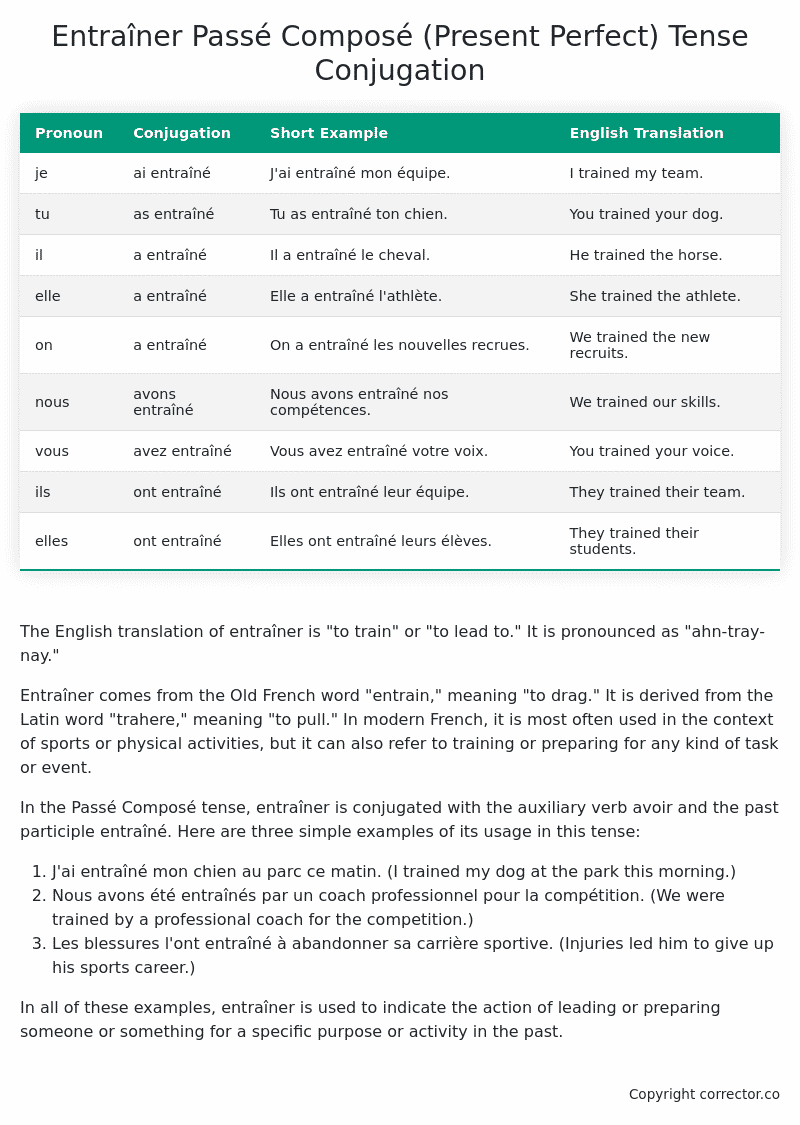Passé Composé (Present Perfect) Tense Conjugation of the French Verb entraîner
Introduction to the verb entraîner
The English translation of entraîner is “to train” or “to lead to.” It is pronounced as “ahn-tray-nay.”
Entraîner comes from the Old French word “entrain,” meaning “to drag.” It is derived from the Latin word “trahere,” meaning “to pull.” In modern French, it is most often used in the context of sports or physical activities, but it can also refer to training or preparing for any kind of task or event.
In the Passé Composé tense, entraîner is conjugated with the auxiliary verb avoir and the past participle entraîné. Here are three simple examples of its usage in this tense:
- J’ai entraîné mon chien au parc ce matin. (I trained my dog at the park this morning.)
- Nous avons été entraînés par un coach professionnel pour la compétition. (We were trained by a professional coach for the competition.)
- Les blessures l’ont entraîné à abandonner sa carrière sportive. (Injuries led him to give up his sports career.)
In all of these examples, entraîner is used to indicate the action of leading or preparing someone or something for a specific purpose or activity in the past.
Table of the Passé Composé (Present Perfect) Tense Conjugation of entraîner
| Pronoun | Conjugation | Short Example | English Translation |
|---|---|---|---|
| je | ai entraîné | J’ai entraîné mon équipe. | I trained my team. |
| tu | as entraîné | Tu as entraîné ton chien. | You trained your dog. |
| il | a entraîné | Il a entraîné le cheval. | He trained the horse. |
| elle | a entraîné | Elle a entraîné l’athlète. | She trained the athlete. |
| on | a entraîné | On a entraîné les nouvelles recrues. | We trained the new recruits. |
| nous | avons entraîné | Nous avons entraîné nos compétences. | We trained our skills. |
| vous | avez entraîné | Vous avez entraîné votre voix. | You trained your voice. |
| ils | ont entraîné | Ils ont entraîné leur équipe. | They trained their team. |
| elles | ont entraîné | Elles ont entraîné leurs élèves. | They trained their students. |
Other Conjugations for Entraîner.
Le Present (Present Tense) Conjugation of the French Verb entraîner
Imparfait (Imperfect) Tense Conjugation of the French Verb entraîner
Passé Simple (Simple Past) Tense Conjugation of the French Verb entraîner
Passé Composé (Present Perfect) Tense Conjugation of the French Verb entraîner (this article)
Futur Simple (Simple Future) Tense Conjugation of the French Verb entraîner
Futur Proche (Near Future) Tense Conjugation of the French Verb entraîner
Plus-que-parfait (Pluperfect) Tense Conjugation of the French Verb entraîner
Passé Antérieur (Past Anterior) Tense Conjugation of the French Verb entraîner
Futur Antérieur (Future Anterior) Tense Conjugation of the French Verb entraîner
Subjonctif Présent (Subjunctive Present) Tense Conjugation of the French Verb entraîner
Subjonctif Passé (Subjunctive Past) Tense Conjugation of the French Verb entraîner
Subjonctif Imparfait (Subjunctive Imperfect) Tense Conjugation of the French Verb entraîner
Subjonctif Plus-que-parfait (Subjunctive Pluperfect) Tense Conjugation of the French Verb entraîner
Conditionnel Présent (Conditional Present) Tense Conjugation of the French Verb entraîner
Conditionnel Passé (Conditional Past) Tense Conjugation of the French Verb entraîner
L’impératif Présent (Imperative Present) Tense Conjugation of the French Verb entraîner
L’infinitif Présent (Infinitive Present) Tense Conjugation of the French Verb entraîner
Struggling with French verbs or the language in general? Why not use our free French Grammar Checker – no registration required!
Get a FREE Download Study Sheet of this Conjugation 🔥
Simply right click the image below, click “save image” and get your free reference for the entraîner present perfect tense conjugation!

Entraîner – About the French Passé Composé (Present Perfect) Tense
Formation of the Passé Composé
Set the auxiliary verb with either
Conjugate the auxiliary verb
Add the past participle
Common everyday usage patterns
Narrating Past Events
Sequential Actions
Describing Completed Actions
Interactions with other tenses
Imperfect Tense
Conditional and Future Tenses
Summary
I hope you enjoyed this article on the verb entraîner. Still in a learning mood? Check out another TOTALLY random French verb conjugation!


